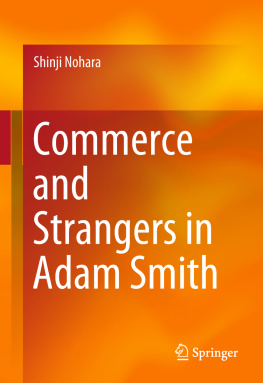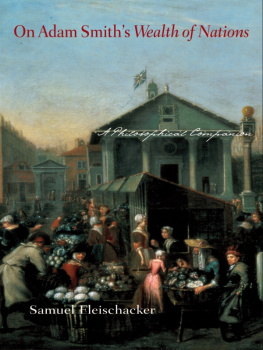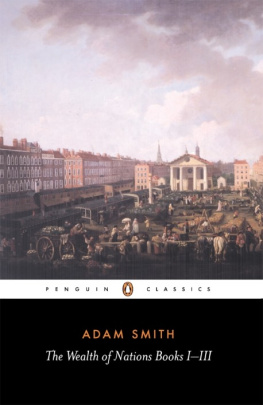Shinji Nohara - Commerce and Strangers in Adam Smith
Here you can read online Shinji Nohara - Commerce and Strangers in Adam Smith full text of the book (entire story) in english for free. Download pdf and epub, get meaning, cover and reviews about this ebook. year: 2018, publisher: Springer, genre: Politics. Description of the work, (preface) as well as reviews are available. Best literature library LitArk.com created for fans of good reading and offers a wide selection of genres:
Romance novel
Science fiction
Adventure
Detective
Science
History
Home and family
Prose
Art
Politics
Computer
Non-fiction
Religion
Business
Children
Humor
Choose a favorite category and find really read worthwhile books. Enjoy immersion in the world of imagination, feel the emotions of the characters or learn something new for yourself, make an fascinating discovery.
- Book:Commerce and Strangers in Adam Smith
- Author:
- Publisher:Springer
- Genre:
- Year:2018
- Rating:4 / 5
- Favourites:Add to favourites
- Your mark:
Commerce and Strangers in Adam Smith: summary, description and annotation
We offer to read an annotation, description, summary or preface (depends on what the author of the book "Commerce and Strangers in Adam Smith" wrote himself). If you haven't found the necessary information about the book — write in the comments, we will try to find it.
This book offers unique insights into how Adam Smith understood globalization, and examines how he incorporated his knowledge of the world and globalization into his classical political economy. Although Smith lived in society that was far from globalized, he experienced the beginning of globalization. Smith considered the most developed society the commercial society: the society that results from people meeting with strangers. Among Enlightenment thinkers, Smith was one of the most important figures with respect to interaction in the world, and it is through his lens that the authors view the impact of the mixing of diverse peoples.
Firstly, the book describes how Smith was influenced by information from around the world. Leaving eighteenth-century Europe, including Smiths native Scotland, people travelled, traded, and immigrated to far-flung parts of the globe, sometimes writing books and pamphlets about their travels. Informed by these writers, Smith took into consideration the world beyond Europe and strangers with non-European backgrounds.
Against that background, the book reinterprets Smiths moral philosophy. In The Theory of Moral Sentiments, Smith developed his moral philosophy, in which he examined how people form opinions through their meetings with strangers. He researched how encounters with strangers created the sharing of social rules. As such, the book studies how Smith believed that people in dissimilar communities come to share common concepts of morality and justice.
Lastly, it provides an innovative reading of Smiths political economy. In The Wealth of Nations, Smith established the market model of economic society. However, he saw the limitations of that model since it does not consider the impact of money on economy and international trade. He also recognized the limitations of his own equilibrium theory of market, the theory that is still influential today.
Shinji Nohara: author's other books
Who wrote Commerce and Strangers in Adam Smith? Find out the surname, the name of the author of the book and a list of all author's works by series.











